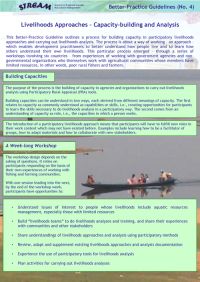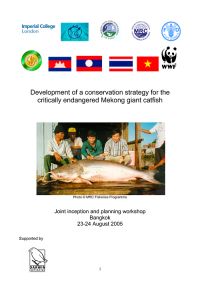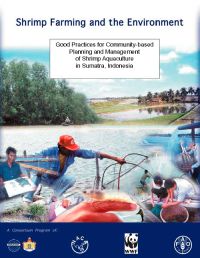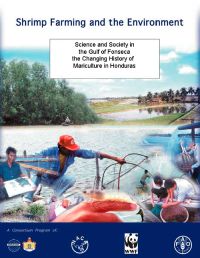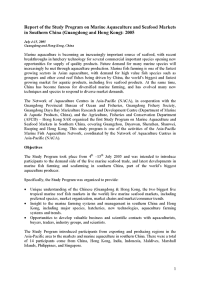This guide outlines a process for building capacity in participatory livelihoods approaches and carrying out livelihoods analysis. The process is about a way of working that enables development practitioners to better understand how people live and to learn how others understand their own livelihoods. This particular process emerged from experiences of working with government agencies and non-governmental organisations who themselves work with agricultural communities whose members have limited resources, in other words, poor rural fishers and farmers.
This is the report of an inception workshop for the Mekong Giant Catfish Working Group. The Mekong giant catfish Pangasianodon gigas is listed as critically endangered in the 2003 IUCN Red List. The purpose of the workshop was to exchange information on the current state of the Mekong giant catfish and the relevant conservation and research activities of key organisations, and to establish a joint planning process aimed at developing an overarching conservation strategy for the Mekong giant catfish.
The case study for this report was conducted in the coastal village Pematang Pasir, Sumatra, Indonesia. Pematang Pasir hosts a pilot project promoting environmentally and responsible shrimp aquaculture implemented by the Indonesian Coastal Resources Management Project. This paper describes the lessons learned to date and offers strategies for community-based coastal resource management, which can be used in a broader perspective as more general guidelines for community-based and participatory development of shrimp aquaculture in marginalised coastal areas.
Shrimp farming in southern Honduras has generated considerable controversy around the issues of natural resource access and management. This case study reviews the reasons for and history of that controversy. The study relies on an extensive literature review and insights from the author’s previous research trips to southern Honduras between 1991 and 2000. In addition, representatives from several government offices, the shrimp industry, and the primary nongovernmental organisations were interviewed in May 2000.
A study tour of seafood markets in southern China (Guangdong Province and Hong Kong SAR) was conducted in 2005. The programme provided participants with exposure to some of China's larges live marine seafood markets, provided insight on marine farming systems and management including major species and technologies, and provided participants with the opportunity to develop valuable business and scientific contacts with farmers, buyers, traders, industry groups and scientists.
